
Iva is a genus of wind-pollinated plants in the family Asteraceae, described as a genus by Linnaeus in 1753. Plants of this genus are known generally as marsh elders. The genus is native to North America.
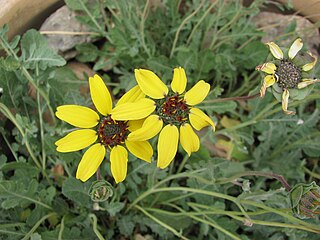
Berlandiera is a genus of flowering plants in the family Asteraceae.

Baccharis halimifolia is a North American species of shrubs in the family Asteraceae. It is native to Nova Scotia, the eastern and southern United States, eastern Mexico, the Bahamas, and Cuba.
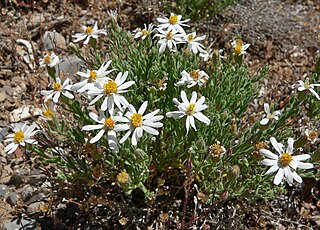
Chaetopappa is a genus of plants in the family Asteraceae which are known generally as leastdaisies.
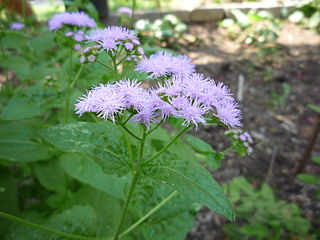
Conoclinium, the mistflowers, is a genus of four species of herbaceous perennial flowering plants, native to North America. They are 0.5 to 2 metres tall, and have blue to purple or violet flowers.

Callisia is a genus of flowering plants in the spiderwort family, Commelinaceae. Members of the genus are commonly known as roselings. It is native to the Western Hemisphere from the southern United States to Argentina. The generic name is derived from the Greek word κάλλος (kallos), meaning "beauty."

Aphanostephus (dozedaisy) is a genus of flowering plants in the family Asteraceae.
Diaperia is a genus of flowering plants in the family Asteraceae, formerly considered part of Evax. Common names include "rabbit's tobacco" and "dwarf cudweed." These are annual herbs native to the northern Mexico and the central and southern United States, primarily the Great Plains.
Aphanostephus pilosus is a North American species of flowering plants in the family Asteraceae, with the common name hairy lazydaisy. It is found only in Oklahoma and in northern Texas.
Aphanostephus riddellii is a North American species of flowering plants in the family Asteraceae, with the common name Riddell's lazydaisy. It is native to the southwestern and south-central United States, as well as to the state of Coahuila in northern Mexico.
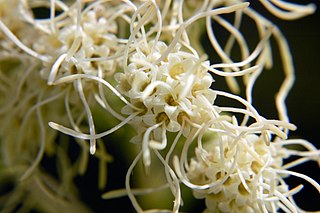
Brickellia eupatorioides, or false boneset, is a North American species of flowering plants in the family Asteraceae. It is widespread in Mexico from Chihuahua to Oaxaca, and in all regions of the contiguous United States except New England, New York, and the West Coast.
Brickellia laciniata, the splitleaf brickellbush, is a North American species of flowering plants in the family Asteraceae. It is native to northeastern and north-central Mexico and the southwestern United States.
Brickellia lemmonii, or Lemmon's brickellbush, is a North American species of flowering plants in the family Asteraceae. It is native to northeastern and north-central Mexico and the southwestern United States.
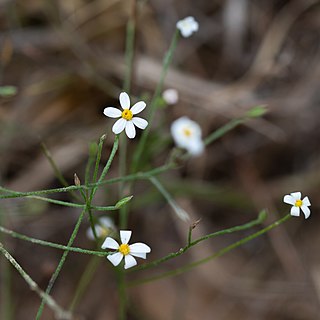
Chaetopappa asteroides, called the tiny lazy daisy, or Arkansas leastdaisy, is a North American species of plants in the family Asteraceae. It is native to the southern Great Plains of the United States and also to northeastern Mexico.

Cirsium horridulum, called bristly thistle, horrid thistle, yellow thistle or bull thistle, is a North American species of plants in the tribe Cardueae within the family Asteraceae. It is an annual or biennial. The species is native to the eastern and southern United States from New England to Florida, Texas, and Oklahoma as well as to Mexico, Belize, Guatemala, Honduras, and the Bahamas.

Cirsium texanum is a species of plants in the tribe Cardueae within the family Asteraceae found in North America. Common names include Texas thistle, Texas purple thistle or southern thistle. The species is native to northern Mexico and the southern Great Plains of the south-central United States.

Diaperia verna, common names spring pygmycudweed, spring rabbit-tobacco or many-stem rabbit-tobacco, is a plant species in the sunflower family, native to northern Mexico and the southern United States.
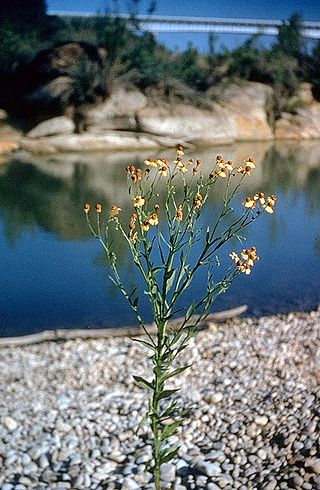
Helenium elegans is a North American perennial plant in the sunflower family, commonly known as pretty sneezeweed. It is native to the south-central United States and to northeastern Mexico.
Heterotheca fulcrata, known by the common name rockyscree false goldenaster, is a North American species of flowering plant in the family Asteraceae. It has been found in northern Mexico and in the western United States.

Quercus sinuata is a species of oak comprising two distinct varieties, Quercus sinuata var. breviloba and Quercus sinuata var. sinuata, occurring in southeast North America.














